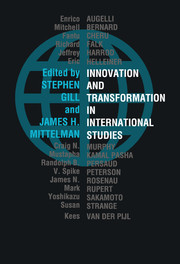Book contents
- Frontmatter
- Contents
- List of contributors
- Preface
- Acknowledgements
- Part I Rethinking and remaking the roots of global social and political theory
- 1 Transformation and innovation in the study of world order
- 2 Consciousness, myth and collective action: Gramsci, Sorel and the ethical state
- 3 The critical realist tradition and the demystification of interstate power: E. H. Carr, Hedley Bull and Robert W. Cox
- 4 Ibn Khaldun and world order
- Part II Political economy: the social and ecological anatomy of transformation
- Part III Transformation, innovation and emancipation in global political and civil society
- Part IV Reflections on global order in the twenty-first century
- References
- Index of names
- Index of subjects
2 - Consciousness, myth and collective action: Gramsci, Sorel and the ethical state
Published online by Cambridge University Press: 05 July 2011
- Frontmatter
- Contents
- List of contributors
- Preface
- Acknowledgements
- Part I Rethinking and remaking the roots of global social and political theory
- 1 Transformation and innovation in the study of world order
- 2 Consciousness, myth and collective action: Gramsci, Sorel and the ethical state
- 3 The critical realist tradition and the demystification of interstate power: E. H. Carr, Hedley Bull and Robert W. Cox
- 4 Ibn Khaldun and world order
- Part II Political economy: the social and ecological anatomy of transformation
- Part III Transformation, innovation and emancipation in global political and civil society
- Part IV Reflections on global order in the twenty-first century
- References
- Index of names
- Index of subjects
Summary
Many students of International Relations would consider Robert W. Cox's greatest contribution to be his opportune introduction of Antonio Gramsci's work to a field that seemed bent on forgetting its own traditions of rich, historicist theorising about fundamental social change. Gramsci offered a non-economistic way to understand fundamental questions about collective action at a time when the dominant liberal and ‘realist’ traditions began to embrace neat (and often simplistic) models of individual rational choice – and when at least one important group of critical scholars (scholars orienting their work towards the transformation of the social worlds that the dominant traditions treat as given) adopted a ‘rational-choice Marxism’ that passed over many of the same issues ignored by ‘structural realists’ and neo-liberal ‘new’ institutionalists.
Yet, as we argue here, much of the specific power of Gramsci's non-economistic and critical analysis that first attracted many students of International Relations to his work comes not from his own innovations in theory, but from the core conceptual breakthrough in the politically much more ambiguous theory of Georges Sorel. It is Sorel's concept of the motivating social ‘myth’, and his modern exemplar, the proletarian general strike, that provide Gramsci with a fundamentally different answer to the collective action ‘problems’ posed by liberal rationalist social theorists. The field of International Relations, as yet, may not have fully absorbed the distinctively ‘Gramscian’ contribution of identifying the fundamental progressive social myth of the industrial age not as that of Sorel's general strike, but as that of the party oriented towards the creation of an ethical state where the distinction between ruler and ruled is no longer essential.
- Type
- Chapter
- Information
- Innovation and Transformation in International Studies , pp. 25 - 38Publisher: Cambridge University PressPrint publication year: 1997
- 7
- Cited by



